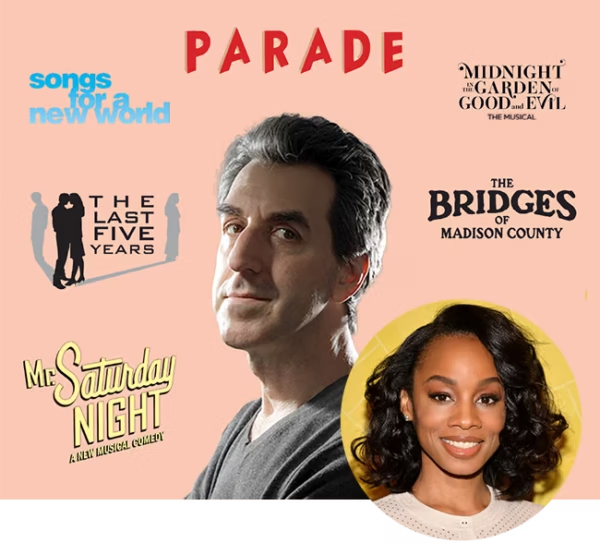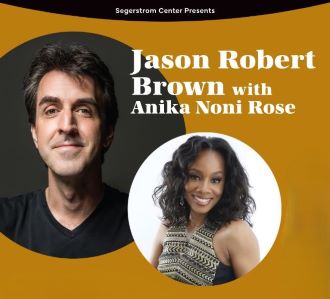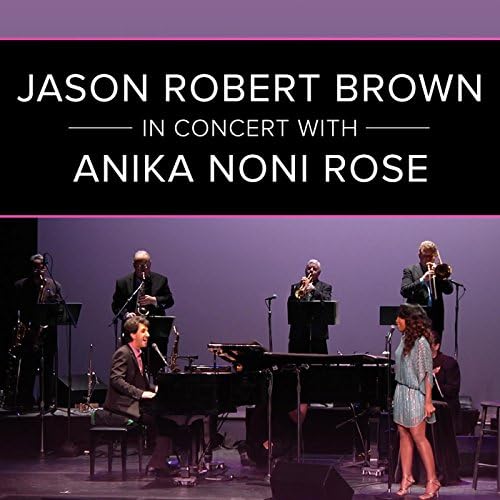A MUSICAL PAIRING WRITTEN
IN THE STARS AND THE MOON
Jason Robert Brown, the revered composer-lyricist who is considered by many as the natural successor to the late great Stephen Sondheim, graced Samueli Hall at Costa Mesa’s Segerstrom Center for the Arts with a three-night cabaret engagement that felt as intimate as it was grand. Against the romantic backdrop of flickering candles and elegantly arranged tables, Brown offered a deeply personal evening of song and story, joined by a crack ensemble and the radiant Tony Award-winning stage and screen star Anika Noni Rose.
Though comparisons to Sondheim are inevitable, Brown’s musical world is distinctly his own. Where Sondheim reveled in cerebral intricacies and labyrinthine melodies, Brown opts for a more direct path, crafting emotionally resonant narratives paired with lush, memorable melodies. His work delves into the personal and the poignant, often illuminating moments of profound human connection. It is a realm he has made his own, and this evening showcased his talents in abundance.
Brown, seated at the piano, was joined by his nimble trio: Linda Taylor on guitar, Dan Lutz on bass, and Jamie Eblen on drums. Together, they created a soundscape that effortlessly moved from bluesy energy to plaintive introspection. Anika Noni Rose, who appeared as a guest vocalist for seven songs, brought a shimmering presence to the stage, her voice embodying both the vulnerability and strength demanded by Brown’s compositions.
Jason Robert Brown opened the evening with “Hope,” a quietly potent ballad he wrote in a moment of reflection and sadness during a previous presidential inauguration. Without explicitly invoking the political storm that inspired it, Brown let the song speak for itself, its simple yet poignant melody carrying the weight of its origins. With an almost hymn-like purity, “Hope” unfolded as a gentle but firm plea for solace and strength, resonating deeply in a room that felt acutely attuned to its message. It was a testament to Brown’s gift for crafting songs that both reflect the times and transcend them, inviting his audience to hold fast to the flicker of light that persists even in the shadow of uncertainty. The song’s lyrics–offered at the end of this review–speak so well to this particular moment in time.
Another of the evening’s most stirring moments was Rose’s performance of “You Don’t Know This Man” from Parade, Brown’s 1998 Tony-winning musical about the tragic story of Leo Frank, a Jewish factory manager falsely accused of murder in early 20th-century Georgia. The song, sung by Frank’s wife, Lucille, is an impassioned plea for justice and humanity in the face of overwhelming prejudice. Rose’s interpretation was hauntingly beautiful, capturing both Lucille’s frustration and her unwavering love. The show itself, about to launch a national tour, is a testament to Brown’s ability to tackle dark historical themes with grace and emotional depth.
From the sweeping tragedy of Parade, Brown transitioned to the intimate world of The Bridges of Madison County, a deeply romantic musical adaptation of the bestselling novel. His performance of “It All Fades Away,” a song in which the male protagonist reflects on an ephemeral but transformative love affair, was as understated as it was devastating. “I thought that love would last forever / I was wrong,” he sang with a voice weathered by time but imbued with raw emotion. The melody, simple and plaintive, underscored the bittersweet realization that even the most profound connections must eventually yield to the passage of time.
Brown also delighted with selections from works in progress. From Midnight in the Garden of Good and Evil, based on John Berendt’s bestselling nonfiction book, he offered “Shed Shack,” a rousing blues number that conjured the smoky ambiance of a Savannah nightclub. The energy shifted with Less, a work-in-progress musical adaptation of Andrew Sean Greer’s Pulitzer Prize-winning novel, where Rose delivered the uproarious “Fuck Love and Get Fat,” a satirical anthem of self-acceptance performed with comic brilliance. These previews hinted at the exciting directions Brown’s career continues to take, balancing humor and pathos with a master’s hand.
A particularly reflective moment came with Rose’s rendition of “Still Hurting” from The Last Five Years, a show that is being revived on Broadway this spring. The song, which opens the musical, is a raw meditation on the dissolution of a marriage, told from the perspective of Cathy, a woman grappling with heartbreak and confusion. Rose’s performance brought a visceral immediacy to the song’s aching lyrics, while Brown’s accompaniment at the piano underscored his unique ability to marry melody and emotion with stunning precision.
Brown’s work as a storyteller shone again in “The Stars and the Moon,” his most performed song, a tender ballad from his song cycle Songs for a New World. This piece, which reflects on the fleeting beauty of relationships, offered a moment of quiet introspection amidst the evening’s larger narratives. Rose’s soulful delivery highlighted the song’s lyrical exploration of love’s fragility, likening it to the ephemeral brilliance of celestial wonders.
 For the die-hard fans in attendance, Brown offered a number from his recent off-Broadway venture, The Connector, with the inclusion of “Voice of My Generation,” a song that encapsulates both the promise and the peril of striving for greatness in an oversaturated world. Brown’s knack for capturing the cultural zeitgeist—equal parts biting wit and poignant self-reflection—was on full display here. Musically, it is perhaps his most ambitious composition to date, a labyrinth of rapid, syncopated piano patterns and shifting time signatures that demand precision and stamina from the performer. The vocal line, equally complex, traverses a wide range and shifts effortlessly between moments of introspection and belt-heavy declarations. Brown further complicates matters by embedding irregular rhythms that mimic the cadences of natural speech, a challenge for any singer tasked with balancing clarity and emotional heft. For Brown as singer and pianist, the song is a feat of almost superhuman coordination, as the intricate piano part often plays in rhythmic opposition to the vocal line. What emerged was not merely a performance but an act of storytelling that tested the very limits of a performer’s technical and emotional capabilities. Despite having one rehearsal, Brown and his crack band pulled off the song without a hitch.
For the die-hard fans in attendance, Brown offered a number from his recent off-Broadway venture, The Connector, with the inclusion of “Voice of My Generation,” a song that encapsulates both the promise and the peril of striving for greatness in an oversaturated world. Brown’s knack for capturing the cultural zeitgeist—equal parts biting wit and poignant self-reflection—was on full display here. Musically, it is perhaps his most ambitious composition to date, a labyrinth of rapid, syncopated piano patterns and shifting time signatures that demand precision and stamina from the performer. The vocal line, equally complex, traverses a wide range and shifts effortlessly between moments of introspection and belt-heavy declarations. Brown further complicates matters by embedding irregular rhythms that mimic the cadences of natural speech, a challenge for any singer tasked with balancing clarity and emotional heft. For Brown as singer and pianist, the song is a feat of almost superhuman coordination, as the intricate piano part often plays in rhythmic opposition to the vocal line. What emerged was not merely a performance but an act of storytelling that tested the very limits of a performer’s technical and emotional capabilities. Despite having one rehearsal, Brown and his crack band pulled off the song without a hitch.
Throughout the evening, Brown interspersed his songs with stories about his career, proudly recounting his interactions with legendary mentors like Harold Prince and Stephen Sondheim. However, his tendency to meander in his storytelling sometimes dulled their impact. Anecdotes that could have been sharp and illuminating occasionally stretched too long before returning to the music. It was a minor flaw in an otherwise luminous evening.
The evening ended on a note of joy and optimism, with Brown performing the spirited “Melinda” and closing with “Wait ‘Til You See What’s Next” from Songs for a New World. It was a fitting encore for a night that celebrated the resilience of the human spirit and the enduring power of song.
Ultimately, the performance reaffirmed Brown’s place as one of Broadway’s most compelling composers. Paired with Anika Noni Rose’s exquisite artistry, the evening was a heartfelt journey through a catalog that continues to resonate deeply, reminding us why Jason Robert Brown’s music holds such a singular place in the theater landscape. Despite his occasional storytelling excess, his ability to conjure moments of profound emotional truth ensured the audience left both moved and inspired.
Jason Robert Brown
with Anika Noni Rose
Samueli Hall
Segerstrom Center for the Arts
played January 16–18, 2025 at 7 pm
for more cabaret events at Samueli Hall, call 714.556.2787 or visit SCFTA
Lyrics to “Hope”
I come to sing a song about hope
I’m not inspired much right now, but even so
I came out here to sing a song
So here I go
I guess I think
That if I tinker long enough
One might appear
And look, it’s here
One verse is done
The work’s begun
I come to sing a song about hope
In spite of everything ridiculous and sad
Though I’m beyond belief, depressed, confused, and mad
Well, I got dressed
I underestimated how much that would take
I didn’t break
Until right now
I sing of hope
And don’t know how
So maybe I can substitute strength because I’m strong
I’m strong enough
I got through lots of things I didn’t think I could
And so did you
I know that’s true
And so, we sing a song about hope
Though I can’t guarantee there’s something real behind it
I have to try to show my daughters I can find it
And so today
When life is crazy, and impossible to bear
It must be there
Fear never wins
That’s what I hope
See? I said hope
The work begins



{ 1 comment… read it below or add one }
I was there and absolutely loved it! Jason Robert Brown truly is a musical genius. The song “Shiksa Goddess” really hit home for me, especially since my nice Jewish son (who is a doctor!), married a non-Jewish girl. But I am so blessed with two beautiful grandchildren, and that’s what really matters. Such a wonderful evening of music and memories.